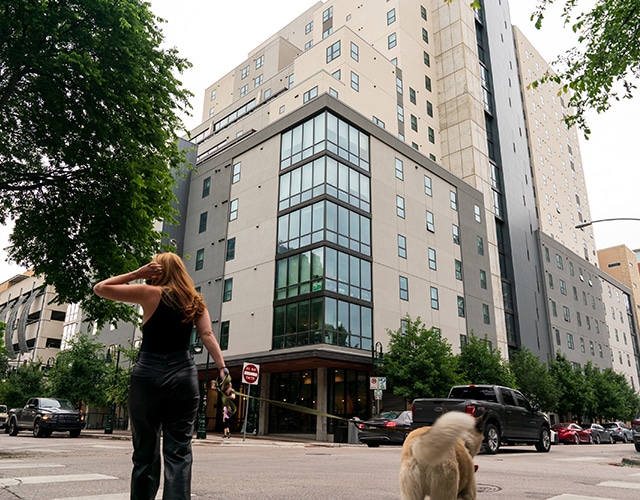Patrick Nelson is a man under siege.
An early player in the off-campus student housing business, Nelson built his property management company by raising money from big lenders and hundreds of wealthy individuals. But his business has soured in recent years, and Nelson — who has so far reneged on promises to pay back some of those partners — now faces more than a dozen lawsuits and a dogfight with a private equity firm.
Nelson is on the hook for at least $115 million, which he has not paid despite escalating fines and interest and twice being held in civil contempt by judges over the alleged misuse of company money. His defiance has frustrated investors and lenders, and irritated some of the judges hearing those disputes.
“I am seeing a lot of money moving around, and I don’t like it,” Justice Melissa Crane said in February at New York County Supreme Court during a hearing involving Fortress Investment Group, a private equity firm that is trying to foreclose on one of Nelson’s properties. In January, Crane held Nelson in contempt of court after finding that he had violated court restrictions by using nearly $3 million from his business to pay for personal expenses, including mortgages on an upscale vacation rental ranch in Utah and a home in California, golfing trips and credit card bills.
“There were bills we had to pay,” Nelson testified at a follow-up hearing March 12. Nelson declined to be interviewed but said in written comments to The New York Times that he is “doing everything he can to live up to his obligations.” He said the civil contempt findings were unwarranted.
Nelson, 51, started Nelson Partners Student Housing in 2018 after parting ways with his brother, with whom he ran a student housing business for nearly two decades. The siblings were among the first to spot an opportunity that has become a $10 billion-a-year market. In 2017, Inc. magazine put their former firm on its annual list of the fastest growing private companies. Big players such as Blackstone have entered the market in recent years, lured by the promise of rent payments that are virtually guaranteed because of student loan money.
Nelson buys student housing properties with the money he raises and uses the rent to pay mortgages and dividends to investors, and also for general upkeep of the buildings, charging fees and taking a commission when he eventually sells them. Through Nelson Partners, he controls 18 properties — each managed as a separate company with separate finances under contractual agreements with investors.
In his written statement, Nelson said his business would be thriving if not for the pandemic, which led to reduced occupancy at some buildings, and articles in the Times about investors suing his business and student residents’ complaints about the state of the properties. Nelson said he had never lost money for investors before the Times’ articles, which he said also “crushed the ability to get loans.”
Nelson has maintained that once he secures new financing and sells properties for a profit, there will be more than enough money to pay investors and erase his debts. On Tuesday, he testified that he was trying to sell three student housing apartment complexes.
Since 2021, there have been more than two dozen lawsuits against him; about half remain active. Tens of millions in claims are still pending. He owes $57 million to Fortress, $50 million to investors, and smaller amounts to other lenders and vendors. He has put companies that own five properties into bankruptcy after they defaulted on loans. And the Internal Revenue Service has placed a $3 million tax lien on one of his Southern California homes.
The first big lawsuits against Nelson and some of his companies came in early 2021 when hundreds of investors in a luxury student housing apartment tower called Skyloft, near the University of Texas in Austin, said they had been defrauded out of tens of millions of dollars.
One of Nelson’s companies had bought Skyloft in 2019 for $124 million, of which $75 million came from small investors — mostly well-off retirees, lawyers, doctors and engineers — and the rest from a hedge fund and a big bank. When the pandemic moved classes online, Nelson said cash flow problems led him to halt monthly dividend payments to investors in Skyloft and other properties.
In 2022, he reached a $50 million settlement with Skyloft investors. The same year, he sold two buildings — one at a profit before the Skyloft settlement, the other for slightly above its purchase price. He returned tens of millions of dollars to investors in those properties, although some received substantially less than they had put in.
But last fall, Judge Karin Crump of Travis County in Texas held Nelson in contempt of court after finding that he violated the terms of his settlement by using money that was meant to go to a restitution fund for legal bills, and taking a commission on the sale of another building instead of returning that money to investors.
Judy Sims said she and her husband, both retirees, invested $250,000 in a Nelson Partners student housing building near the University of Northern Colorado in Greeley, Colorado, but they expected to lose much of their investment after the lender moved to foreclose on the building in 2023.
“He sounded very nice on the phone when he wanted our money,” said Sims, who lives with her husband in Chelan, Washington. “But what makes me so mad is he won’t accept any responsibility.”
In court, Nelson’s lawyers have described the disputed money transfers, including those he directed toward personal use, as legitimate “intercompany loans” consistent with how he has always run his business. They have argued Nelson is simply doing what is necessary to keep his business from collapsing. Nelson testified at the March 12 hearing that he was concerned that the 130 people Nelson Partners employs would lose their jobs. He also said he wanted to “leave a legacy for my daughters.”
“I really don’t understand what his endgame is,” said George Wong, 64, a marketing executive in Los Altos, California, who has invested in three of Nelson’s deals.
One of Nelson’s biggest disputes is with Fortress, the New York investment firm. For more than two years, Fortress, which acquired a $52 million loan made to a Nelson Partners company that owns the Auraria Student Lofts in downtown Denver, has been trying to foreclose on the building. But the action was put on hold after Nelson put that property into bankruptcy in 2022.
A bankruptcy filing halts a foreclosure and gives the borrower more time to potentially negotiate a deal, but it doesn’t necessarily avoid losses for investors.
Last summer, Fortress secured a judgment allowing it to collect on the loan now worth $57 million with interest and which Nelson had personally agreed to repay. That set the stage for the current round of contempt proceedings before Crane.
Nelson has called Fortress a “vulture” investor that acquired the loan on Auraria during the pandemic and is now “trying to essentially run me out of business.”
The two sides are supposed to appear again before Crane on Monday, as she wrestles with Nelson’s noncompliance with her earlier court orders.
Martin Goodman, 60, a real estate broker who lives in San Diego, said he had tried to rally investors in the Greeley student housing complex to come up with a plan to stave off a foreclosure by Fannie Mae, the federally backed mortgage finance giant. Fannie recently got court approval to foreclose in April.
Goodman said he expected Nelson to file another bankruptcy.
“At the end of the day, we may very well lose the property,” Goodman said. “All because Pat won’t step up.”
c.2024 The New York Times Company. This article originally appeared in The New York Times.







